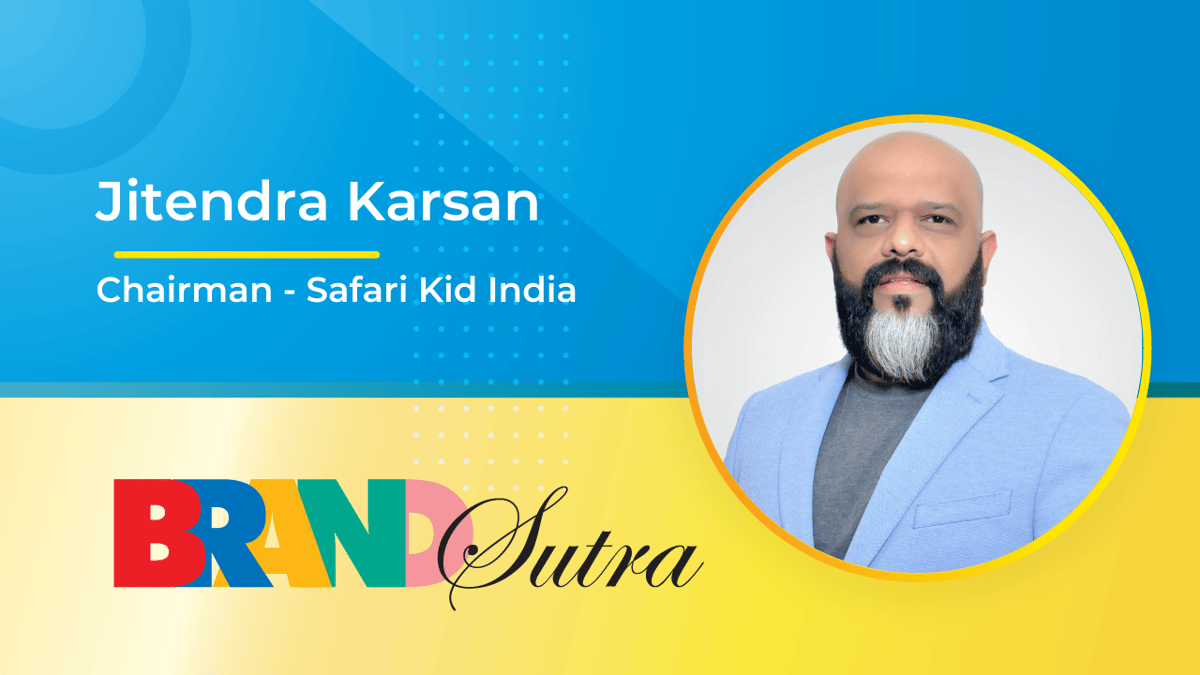Safari Kid is an international brand of preschools that started in 2005. Jitendra Karsan, Chairman at Safari Kid India joined the brand in 2013 after having realised certain flaws in the educational system through first-hand experience with his daughter. He and his wife took it upon themselves to do something that not only helps their children but all children.
Edited excerpts…
What are some of the methods of teaching and learning that Safari Kid employs?
Kids have difficulties learning during their initial years. They’re suddenly exposed to new symbols and sounds and many don’t even learn English as their first language. We did some research around new-age curriculums that have elements of classical techniques as well as new-age, research-based techniques. The most common method of teaching a child the alphabet is to go on rote mode. You make them repeat the same thing over and over for a whole year so it becomes part of their subconscious memory.
A post shared by Safari Kid Global Preschool & Daycare India (@safarikidindia)
Where we differentiate is we have more techniques in teaching and try to understand what suits the child best. So if a child likes art, we try to explain it to them using art. If the child is more logical, we try to explain it to them using their logic. When you work with all the child’s senses, and not just rote learning, the learning becomes quicker.
Similarly, we use techniques to help them understand spelling and pronunciation and introduce them to math at an early age. Apart from the basic curriculum, as a school, we believe we are supposed to teach our kids more things about the world. We introduce them to basic things like our community helpers – doctors, policemen and firemen – through hands-on activities. So they’ll spend a few hours at a police station or a fire station, so it’s very hands-on, experiential learning.
Is there a significant difference between kids who have learned through experiential learning techniques versus kids who have learned through the more traditional ones?
Often we’ve heard our children have to be put in a separate class because they’re more advanced. And when that happens, their curiosity just goes away and they’re not interested in the class. For example, most of our kids, once they’ve cleared level four, already know how to spell and can read small stories.
A post shared by Safari Kid Global Preschool & Daycare India (@safarikidindia)
Now, when they go into first grade, they are back to smaller words and an easier curriculum. And the rote learning part especially just doesn’t interest them. However, students who go to schools that are more experiential and problem-solving, like, at an IB or an IGCSE, thrive.
What have been the brand’s most effective marketing strategies?
While we are on social media and Google, most of our admissions are through word-of-mouth. We are operational at 13 preschools in India with seven under construction. Quality is extremely important to us. We can’t open schools in every nook and corner because it’s a niche program that attracts parents whose expectations of education are slightly different. There is also a difference in the way our staff and security behave and engage with parents and children because they all go through training. It’s these things that work in our favour.
What is your understanding of what a child needs from education?
We cannot precisely predict what will happen 10 years from now. And what we’re seeing today is that children who took up technical subjects like programming, well today AI can do most programming. So how do you decide the curriculum of preschool where you don’t know what’s going to happen in the next 10 to 15 years? So while the technical aspects of the world will change, it is the classical things like creativity and problem-solving that will remain a constant need. Children can learn anything if they are exposed to it at an early age. So it comes down to the parents to decide what they expose their child to.
What is your take on introducing young kids to technology?
The way the world is moving, if you give a phone to a one-year-old who has not even learned how to talk, they’ll be able to operate it. It’s that easy for them. And this is because every child is programmed to take in 360-degree input.
We do start to introduce kids to technology at a young age. For example, we have these small toys with buttons on them that move the toy left to right and forwards and backwards. We then create a path or a line with tape and teach the child to move the toy along the line. The idea is to teach them logic.
However, their screen time has to be restricted. If you’re going to put television in front of a child for 10 hours a day, that’s going to be harmful because their brains are still developing. They take in stimulation very strongly and it releases dopamine which could cause them to form an addiction. However, if they use screens for half-an-hour, that’s not bad.
A post shared by Safari Kid Global Preschool & Daycare India (@safarikidindia)
Do you have a last word to readers?
There are a lot of misconceptions about preschools and fear about what is the right age to go. Some paediatricians and parents believe that sending them to school will probably make them catch the flu and get sick. But if the kids are not going to use their immune systems, they won’t develop.
Parents are receiving a lot of information through books and podcasts, often getting swayed by popular opinion. But there is a difference between a belief and a fact. When parents come to us, we tell them the facts and they often see what we stand for.
Many parents want to protect their children from certain emotions. But what will happen when the kids start to see the problems of the world? We don’t want to expose a two-year-old to war but we do want them to understand that hurting someone is bad. And this is something they will also realise when they feel hurt. The more we bubble wrap the world for them, the more problems they will experience as they grow up.




